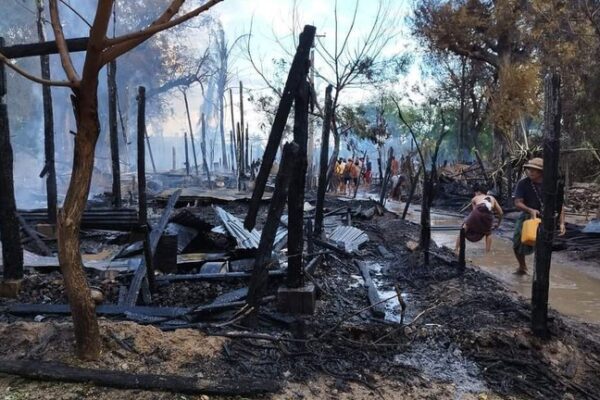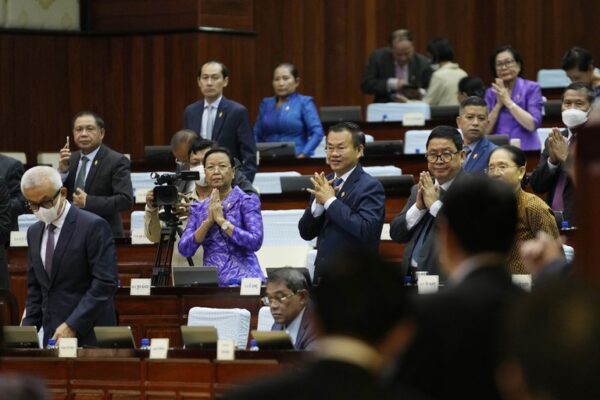As President Xi Jinping began a third term in office pledging “Chinese-style modernization” in October 2022, commentators expected him to steer China further in the direction of a state-dominated, planned economy. Xi’s ideology sounded an ominous note for the private sector, as well as for private individual wealth and influence. Meanwhile, three years of China’s zero-COVID policy sounded the death knell for many private companies, prompting an exodus of wealthy and middle-class Chinese who had previously benefited from the post-Mao economic boom. Meng Jun, a former vegetable salesman-turned-flight charter agent-turned-rubber factory boss who now lives in Florida, was one of them. “When the pandemic hit, I started to reflect on things, and to watch what was happening,” Meng Jun, who once headed up three companies turning out rubber goods in Guangxi, Chongqing and Beijing with a total turnover of 300 million yuan a year, told Radio Free Asia. “And I found that the actual problem was with the system as a whole, which made people bad,” he said. “I figured that if I carried on much longer, I’d get dragged down with some official, because, as someone who gave bribes, I would be implicated.” Meng in his heyday was a smooth operator, cashing in on relationships cultivated with local officials in his main stamping ground in the southeastern region of Guangxi. In 2000, officials in Guangxi’s Beihai city let him get his hands on an unfinished property, thanks to a total lack of transparency around government property deals, and a 200,000 yuan kickback to a local official. Meng Jun bought this unfinished government-owned building in Guangxi’s Beihai city in 2000 and then flipped it for a profit. Credit: Provided by Meng Jun “I moved very quickly, and made a million in less than six months,” Meng said. “I just packaged it up to some kind of rough standard and sold it on.” “There were so many unfinished buildings around at that time, more than a million square meters, all of them owned by [the local government].” ‘Total U-turn’ Former tech CEO Hu Liren knew as early as 2018 that it was time to leave. “Nobody wants to leave their home country,” Hu, who also lives in Florida, where he has become friends with Meng, told Radio Free Asia. “But I had no choice.” “Things had gotten so bad in China, and there was no way they were going to get better,” he said, in a reference to Xi Jinping’s renewed emphasis on state-owned assets and a planned economy. “In the four years since I left, there has been a total U-turn, exactly the way I thought there would be at the time.” It’s a far cry from the economic boom-time of the 1990s where both Hu and Meng made their fortunes. Back then, in 1994, China was putting out more than 2% of global economic output, while the number of private companies grew from zero in 1978 to 1.76 million by 2000. Hu Liren and his team when he was the CEO of an internet company in China in 2000. Credit: Provided by Hu Liren “It was great, very prosperous,” Meng said. “As long as you worked hard and gave it your all, you could make a lot of money.” “Everything was plain sailing, and it was possible to succeed at anything you did, and make money at it, too,” he said with a sigh. The private sector was booming so hard back then that the catchphrase “56789” was born, the first and last digits reminding people that it was contributing around 50% of government tax revenues, and was the source of around 90% of new jobs. ‘To get rich is glorious’ Deng’s golden era of market liberalization and breakneck economic growth spawned other catchphrases too, like “To get rich is glorious,” giving the go-ahead to an emerging generation of private entrepreneurs, freed from the political orthodoxies of Maoist China. Hu and Meng were among them. Born in the northeastern province of Jilin to working-class parents who were made redundant during the mass layoffs of the late 1980s, Meng started working various jobs straight out of high school in 1989. “I would sell vegetables and do other seasonal stuff with my friends, all across Jilin, Yanji, Changchun and Mudanjiang,” he said, referring to cities in northeastern China. His search for work took him to the southern island province of Hainan, where he eventually saved enough money to open up his own seafood restaurant in 1993. Meng Jun in 2010. Credit: Provided by Meng Jun “During that period from 1993 to 2000, I started my own seafood restaurant, and also got into chartered flights,” Meng said. “That was very profitable because at that time I had a monopoly.” “Then I started doing cross-border trade, because I knew Vietnam, which was really actually smuggling,” he said, adding that he raked in nearly 500 million yuan at that time. Raking it in Hu was born in Shanghai to a family of intellectuals and started working in a research institute focusing on television technology in the mid-1980s. When the institute was shut down in 1991, he found work at a foreign company. By the time the internet was changing the face of business in 1997, Hu was also raking in the money, working for a company owned by Hong Kong tycoon Li Ka-shing, Mei Ya Online. “I became the director and executive vice president of this Mei Ya Online, and I had equity in it.” he said. “The annual income at that time was 400,000 to 500,000 yuan.” Boosted by stellar connections with He Xingtong, grandson of Communist Party elder He Long, and invited to lecture to officials in Shanghai and Beijing, Hu went on to run an investment research and credit ratings company, as well as founding a green tech company making air-conditioning systems for factory shop floors. Hu Liren during his entrepreneurial era. Credit: Provided by Hu Liren “We were growing at a rate where we were doubling our profits annually,”…








